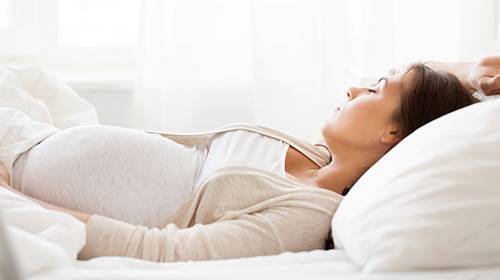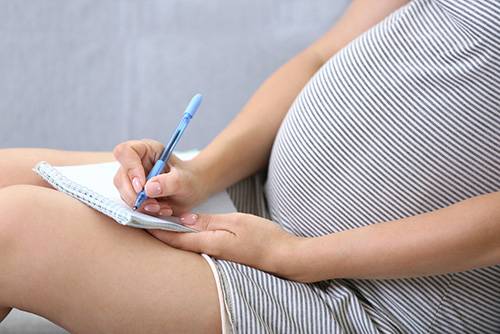
Also see: Best Pregnancy Pillows
Why Sleep During Pregnancy Matters a Lot
Before expecting, you might have gotten used to a hectic sleeping schedule without noticing too many repercussions in your day-to-day life. However, this has to change while being pregnant, because not getting enough sleep takes a toll on both the mother and the baby. Lack of sleep impacts a lot of our systems and the way that our bodies and minds work.
One of the first systems to be hit is the immune system. In fact, researchers seem to believe that lack of sleep has a negative impact on fetal health. Furthermore, sleep helps regulate the level of blood sugar, so not sleeping enough might lead to gestational diabetes mellitus.

Even if there isn’t enough research to support these claims, researchers also suspect that sleep deprivation leads to painful labor, depression, the need for a C-section, preterm birth, and low birth weight.
Sleep Problems During Pregnancy
There are plenty of changes going on in the body, and not all of them are pleasant. In fact, there are certain sleep-related problems that tend to be quite common during the period, with the three most common ones being:
- Obstructive sleep apnea is caused by the nasal congestion combined with weight gain that a lot of women start experiencing during pregnancy. This goes beyond the problem of mere storing and could lead to elevated blood pressure. Another potential problem with obstructive sleep apnea is the fact that it can restrict oxygen flow to the fetus, increasing the odds for gestational diabetes, preeclampsia, and can even result in the need for a C-section.
- GERD (short for “Gastroesophageal Reflux Disorder”) is a condition better known as acid reflux. Expecting mothers with GERD experience a burning sensation in the esophagus when lying down, leading to an uncomfortable sensation that could cause insomnia regardless of the pregnancy trimester.
- Restless leg syndrome is a problem that occurs because of a sensation of itching, crawling, or tickling in the legs, causing an uncontrollable need to move them constantly. Women that experience restless leg syndrome usually have a hard time falling asleep.
Pregnancy & Insomnia
All of the conditions mentioned in the previous section, alongside a few others that we’ll mention shortly, can lead to one of the most common sleeping disorders known to man: the dreaded insomnia. This problem is characterized by either the difficulty in falling asleep or problems in staying asleep (for some people, it can be both at the same time). For expecting mothers, insomnia is most common during the first and third trimesters, but there are women that experience it throughout the whole pregnancy period.
The bad news is that insomnia causes a lot of discomfort for a pregnant woman. The good news is that insomnia in itself is not harmful to the baby.
Aside from the three major problems we mentioned earlier, insomnia is also caused by shortness of breath, discomfort in the abdomen, back pain, breast tenderness, nausea, vomiting, or the need to frequently urinate.

Pregnancy & Sleep Positions
When expecting, sleep becomes a precious thing, especially if you’re experiencing all kinds of sensations and problems that are preventing you from getting a good night’s rest. Finding the right sleeping position when you’re expecting is quite challenging and, while it’s true that we all have different sleeping preferences, science says there is a right and a wrong way to sleep while expecting a baby:
- If you enjoy sleeping on your stomach, this isn’t necessarily a problem in the first trimester, but as your baby gets bigger and your bump grows, you’re going to find it impossible to sleep in this position anymore.
- If you are a back sleeper, you can get away with it in your first trimester. However, doctors suggest that you avoid this position during the second and third pregnancy trimesters because this position favors the weight of the uterus and the baby to fall on your back and intestines, and can also obstruct the vein that carries blood from your lower body to the heart. A lot of problems can occur if you choose to sleep on your back when the belly bump is growing: backaches become frequent, hemorrhoids will make an appearance, digestion becomes less efficient, circulation can be cut, and you can also end up having low blood pressure. In turn, your baby can end up having less oxygen and nutrients. However, there is no need to worry if you fell asleep on the side and woke up on your back: it’s constantly sleeping in this position that causes trouble.
- Sleeping on the side is the best idea if you are an expecting mother. The left side is preferred because it helps maximize the nutrient and blood flow circulating to the placenta and helps enhance kidney function in the process, helping your body eliminate waste and reducing swelling in your feet and hands.
Tips for Better Sleeping During Pregnancy
Sleep hygiene is important for everyone, not just for future mothers. However, there are plenty of things that are part of a healthy sleeping routine that most of us tend to neglect. Feeling overwhelmed might cause you to neglect the activities that help you get a better sleep, so let’s take a quick look over the most common things that people do when they want to have a healthy and proper sleeping routine:
- Avoid electronic devices before you go to bed. This includes smartphones, tablets, and other gadgets that produce light. Blue light signals the brain that it’s not time to fall asleep yet and can reduce melatonin production, which is something you want to avoid before going to bed.
- Make sure that the room temperature is optimal and that you won’t wake up feeling too hot. If possible, try to crack open a window if you sleep in a hot bedroom.
- Try to meditate and practice breathing exercises before bedtime. Some women use sleep apps, while others turn to yoga in order to practice meditation. Either way, relaxing your nervous system before bed is a wonderful idea.
- Make sure that you avoid going to sleep with a full stomach. One mistake that a lot of people make is eating heavy meals before bedtime, so try to eat earlier in the evening and limit your snacks before you try to sleep. If you get the munchies, try to eat something light and healthy, like whole-grain crackers or a warm glass of milk.
- Invest in a proper pregnancy pillow or use several pillows while you sleep in order to get better support and rest in a comfortable position. Pregnancy pillows usually run along the length of your entire body, and they roll it to keep your spine aligned, prevent you from rolling over while you sleep, and support the weight of your belly.
- Try listening to some relaxing music before you go to sleep. Music with tempo that mimics the rhythm of a normal resting heart can actually soothe you and have your own heart beat to the speed of the music.
- If you notice that you spend a lot of time in bed and don’t actually fall asleep, don’t just lie there and wait for something to happen. Make yourself a cup of relaxing tea or listen to some music. Do whatever it takes to get you into a more relaxed mood.
Conclusion
Cycling back to the question that got us here in the first place: sleeping on your back is only okay during the first trimester of pregnancy and it should be avoided in the second and the third.






